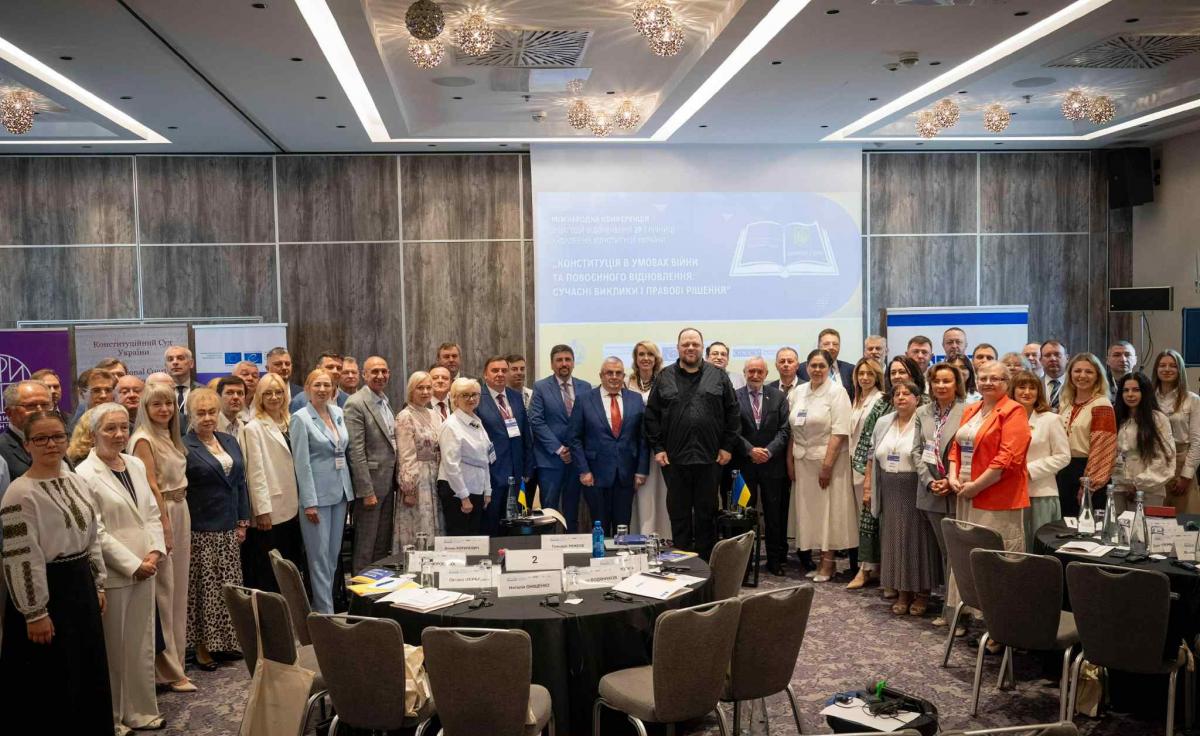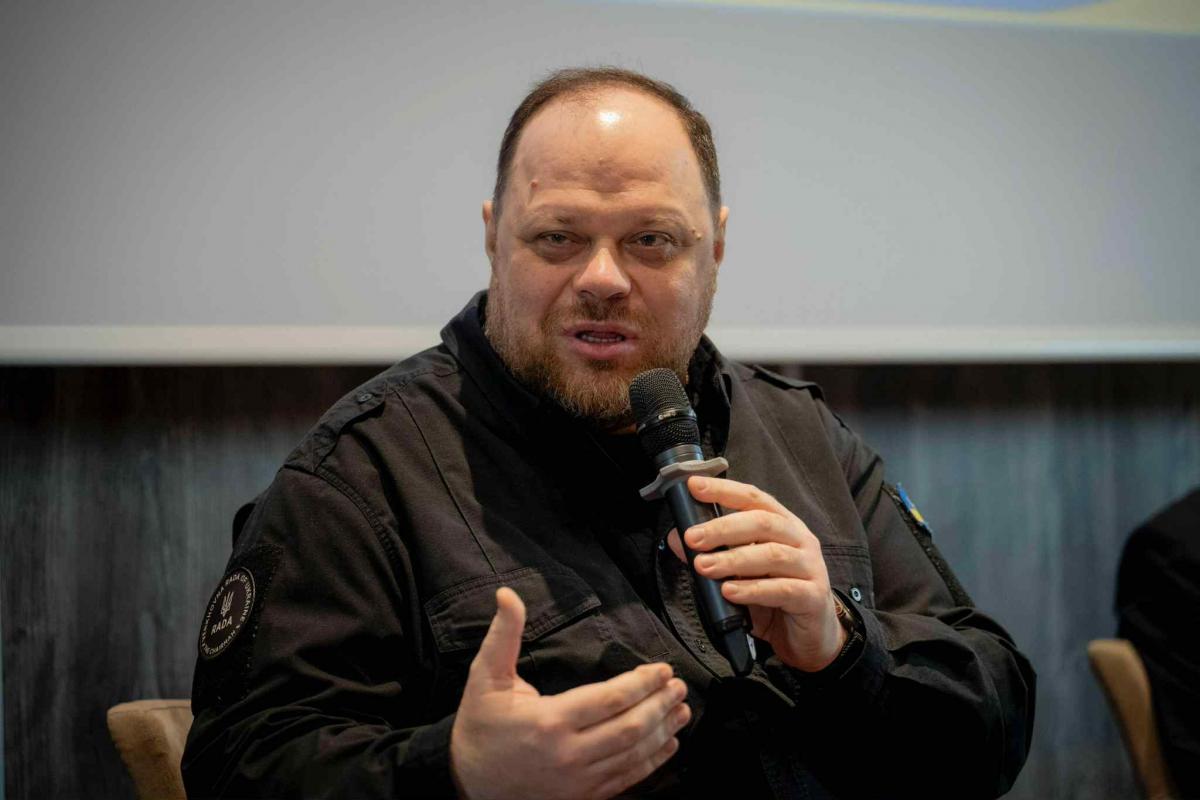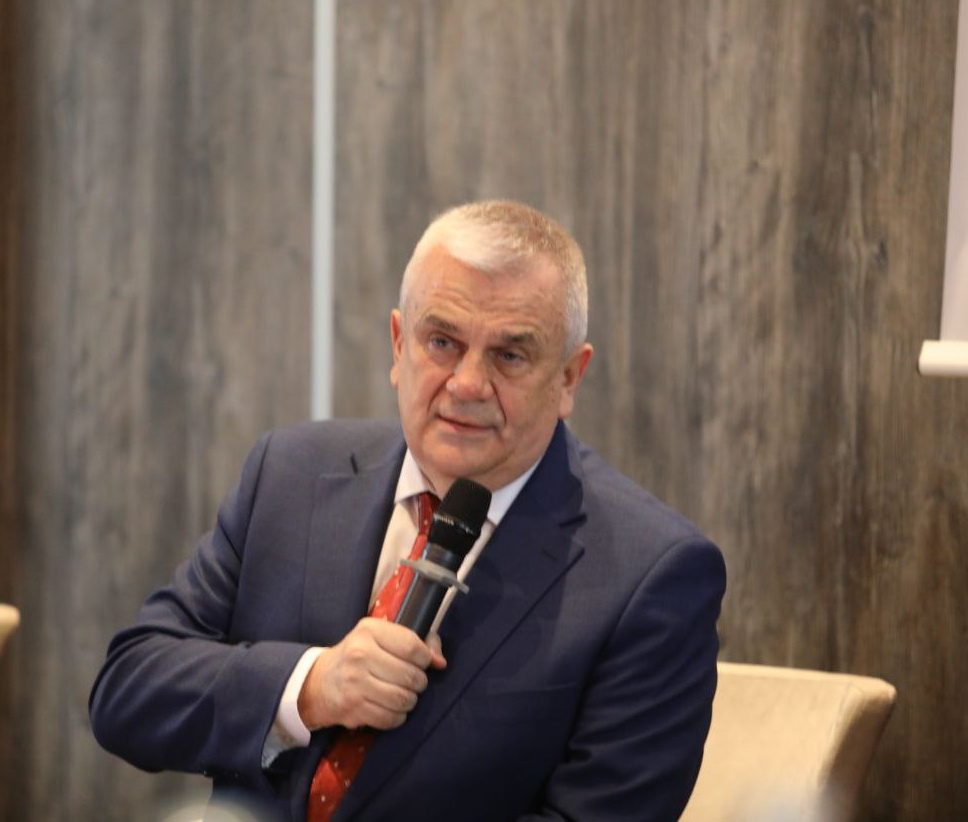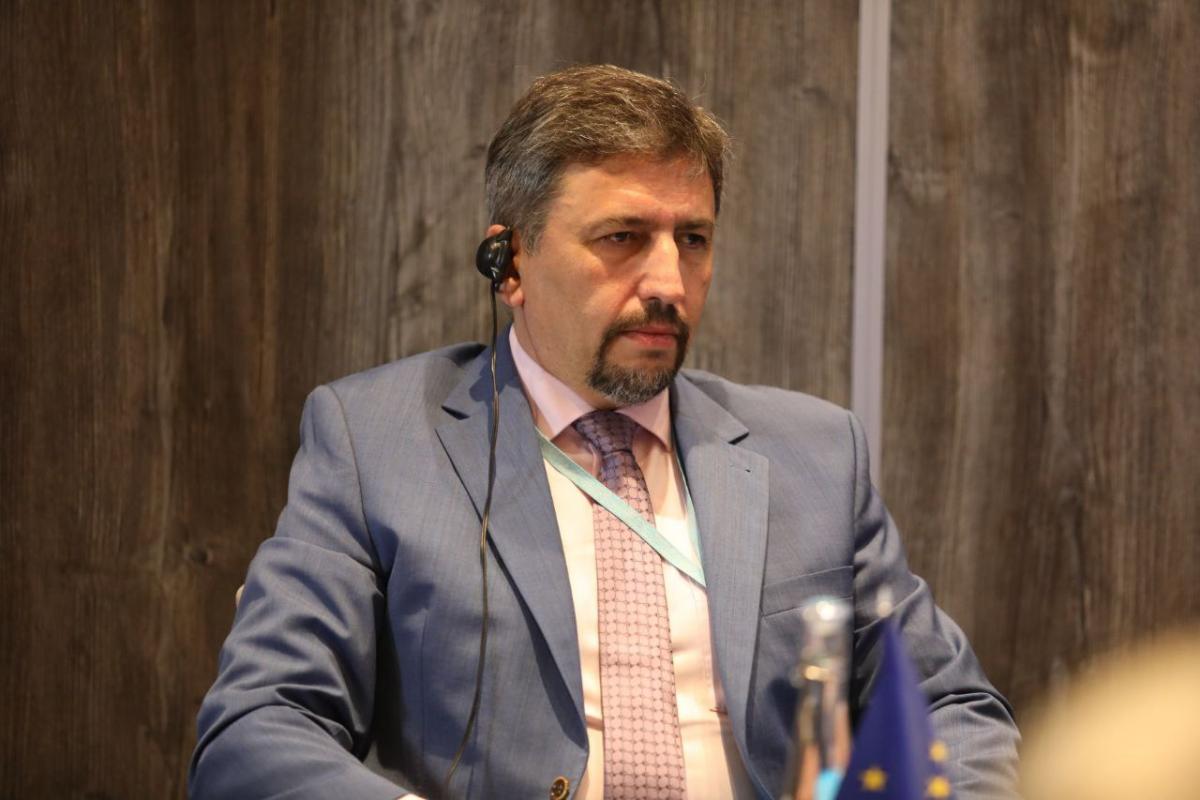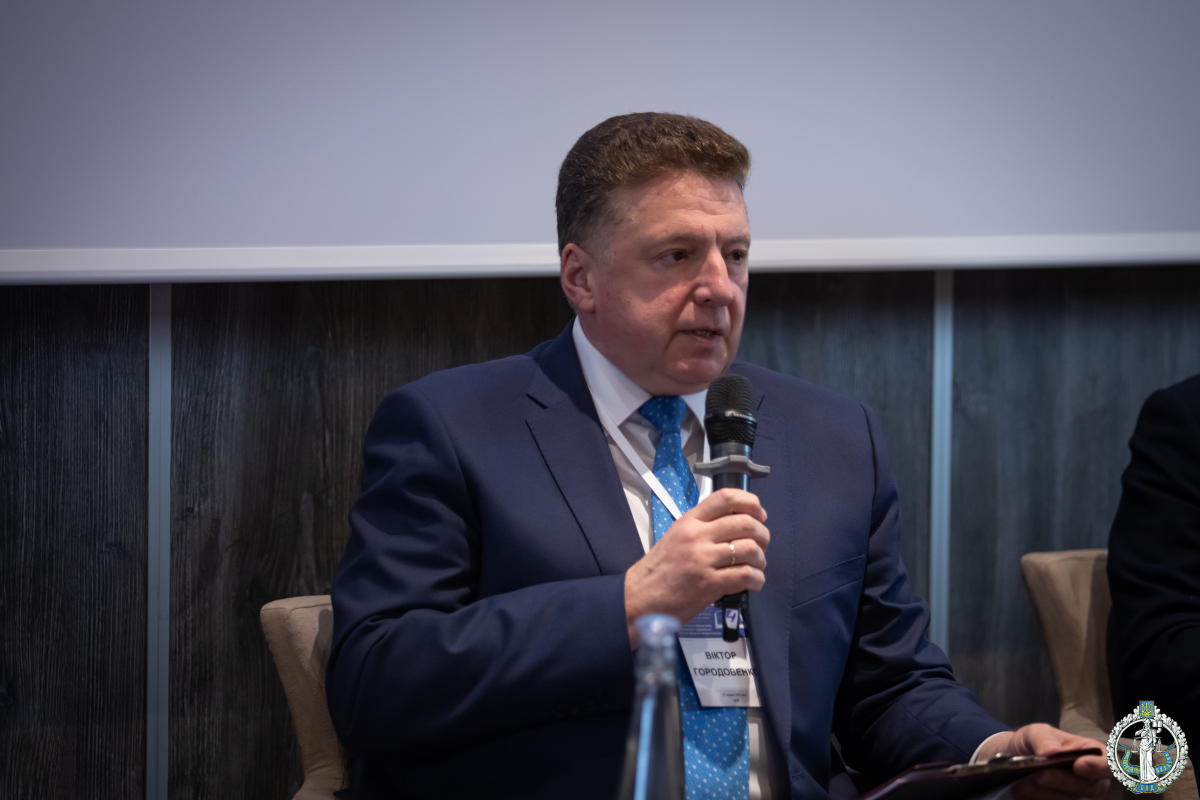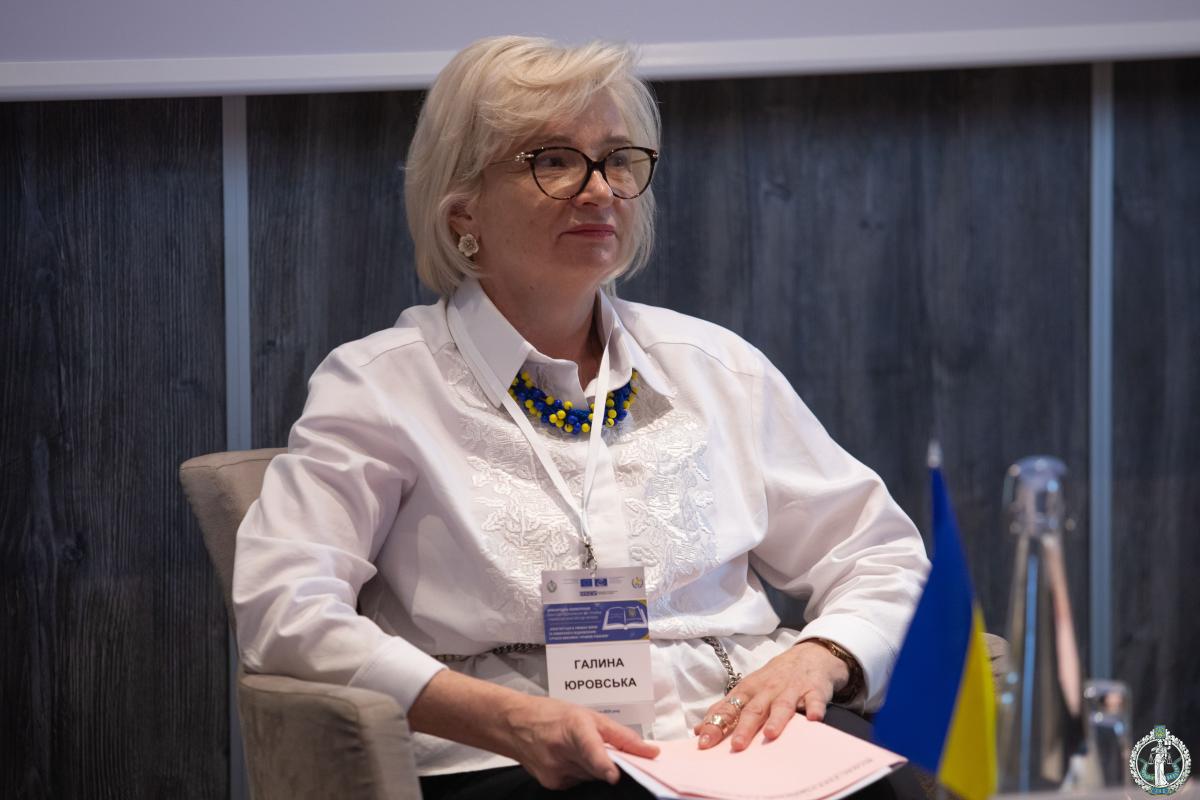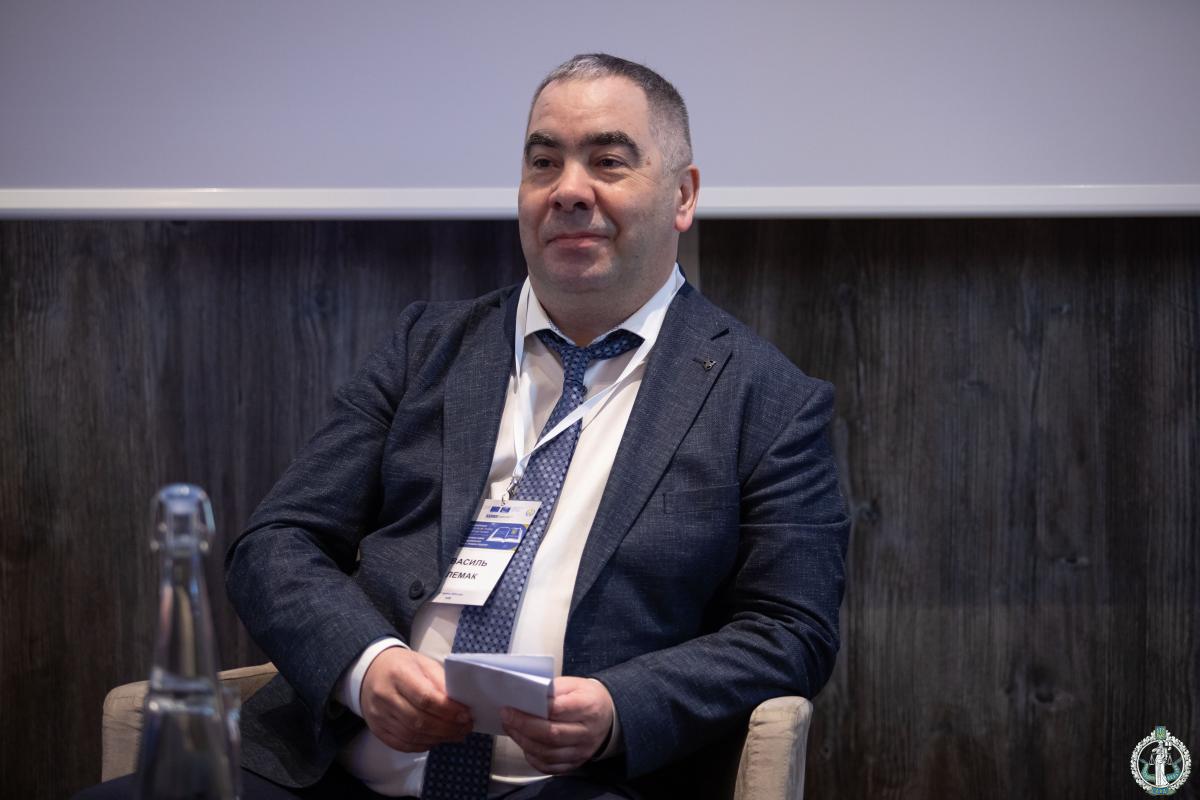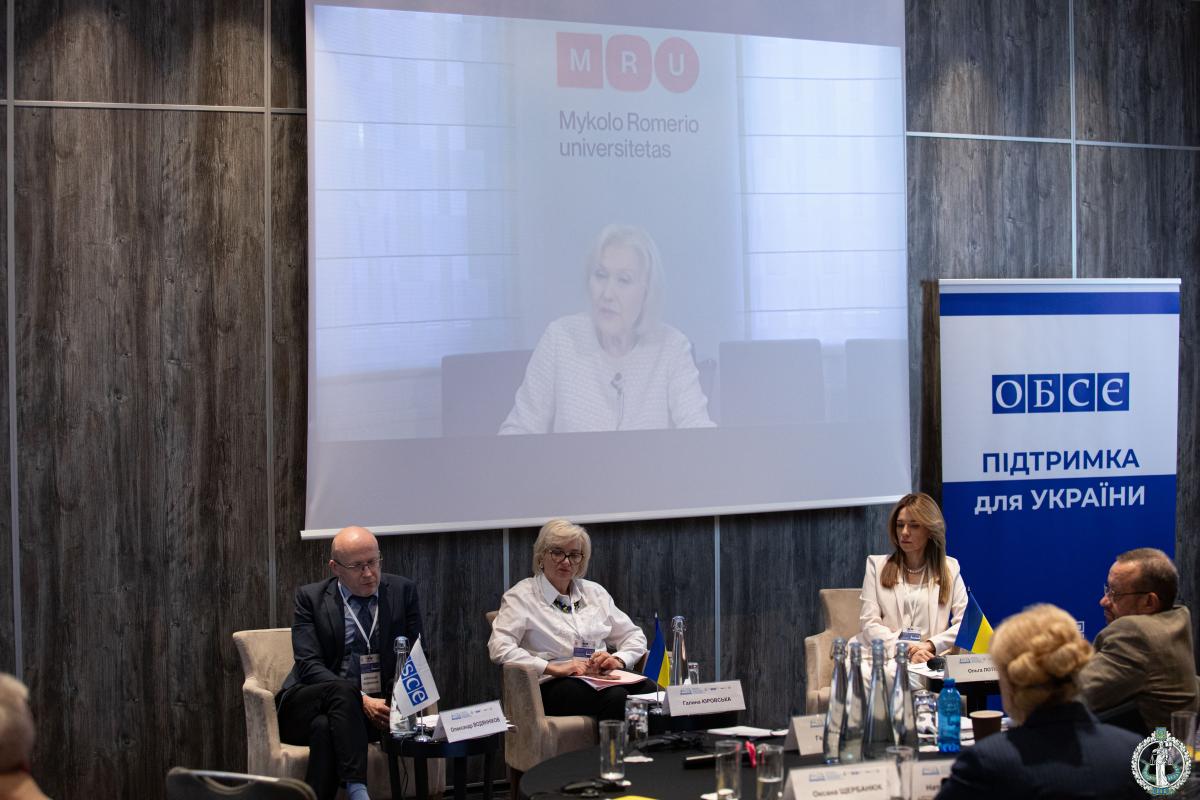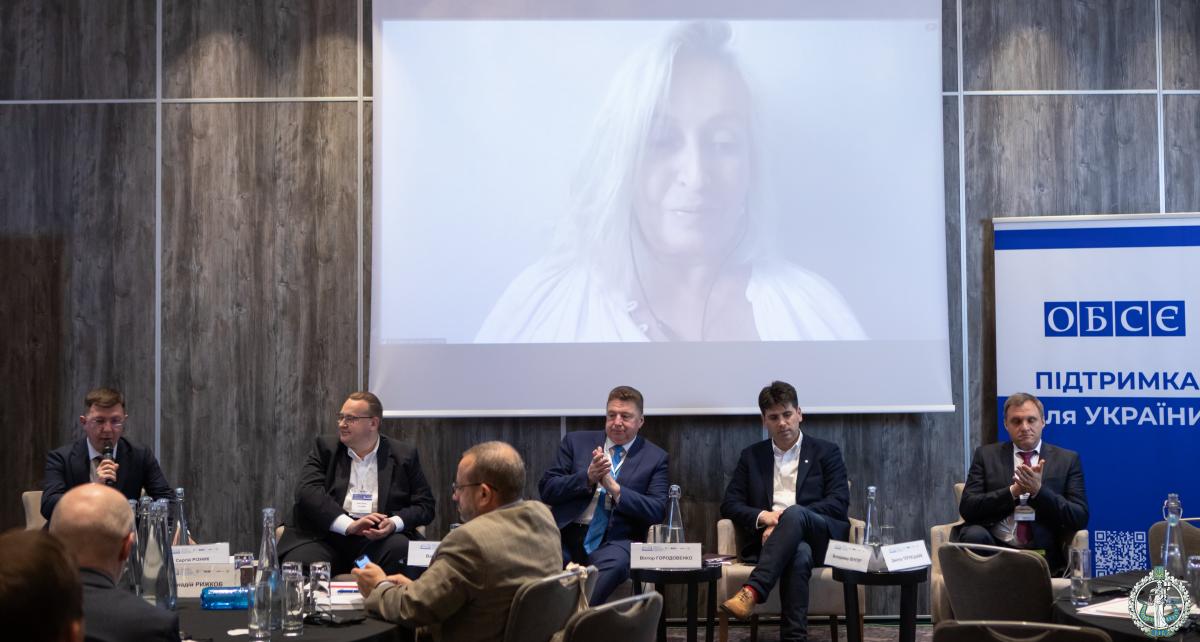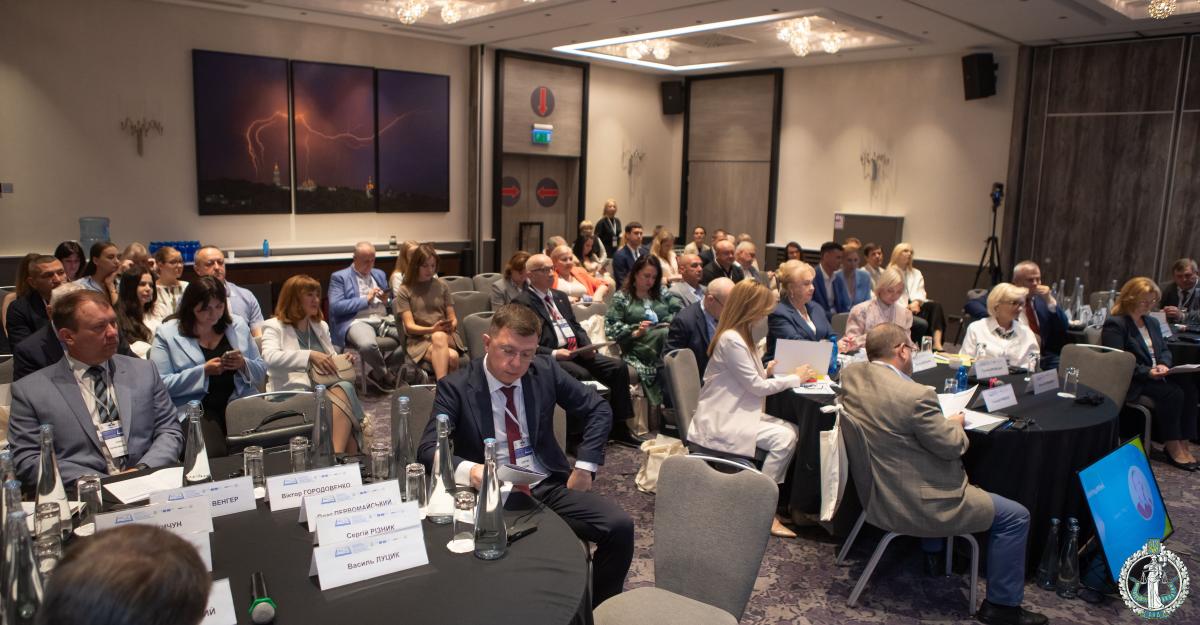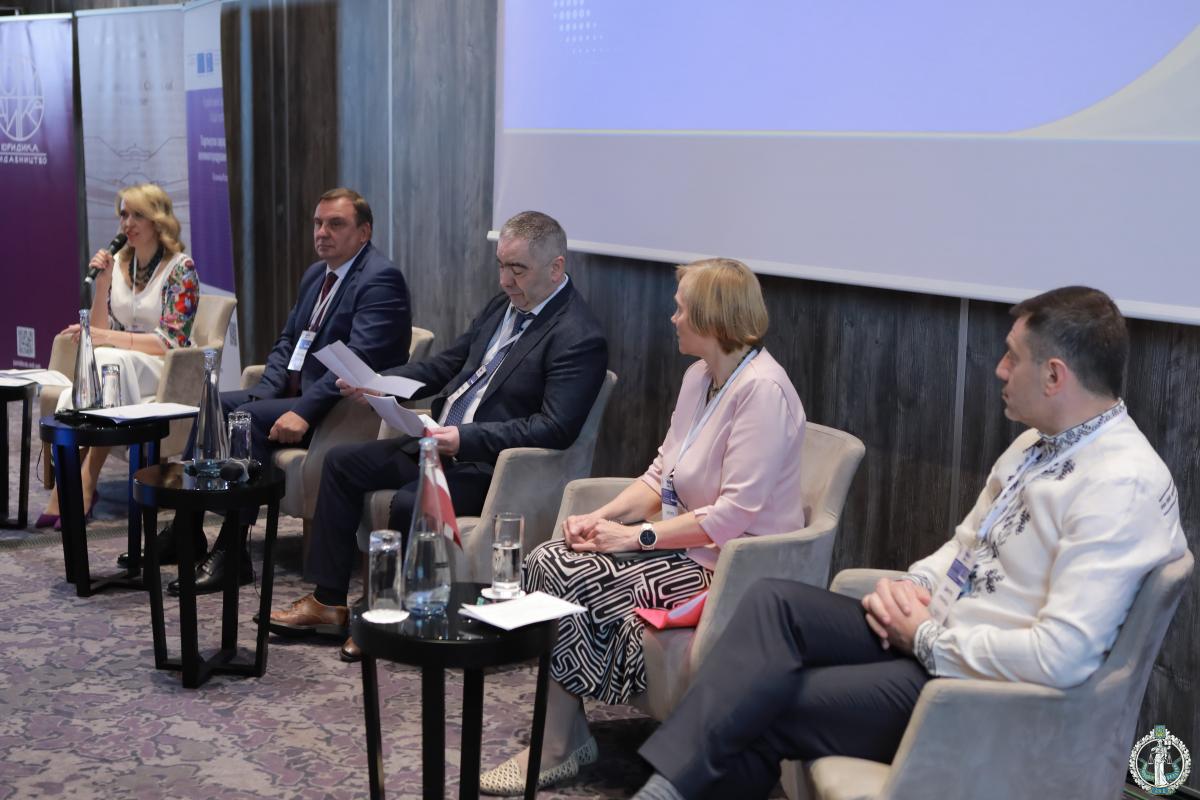30 June, 2025
On 27 June 2025, the Constitutional Court of Ukraine held an international conference “The Constitution in the Conditions of War and Post-War Reconstruction: Contemporary Challenges and Legal Solutions” dedicated to the 29th anniversary of the Constitution of Ukraine.
The event was organised by the Constitutional Court of Ukraine in cooperation with the National Academy of Legal Sciences of Ukraine and supported by the OSCE Project “Support to National Stakeholders through Improved Access to Constitutional Justice” and the Project “Support to the Development of Constitutional Justice in Ukraine”, implemented within the European Union and the Council of Europe Joint Programme “Partnership for Good Governance”, Phase III.
The scientific conference brought together judges of the Constitutional Court of Ukraine, former judges of the Constitutional Court of Ukraine, academics, legal experts, representatives of state institutions, judicial institutions, constitutional justice bodies of European countries and international organisations.
During the event, the participants analysed the challenges facing our country today, discussed a number of issues, in particular, the protection of the constitutional order by national courts during the war; the Fundamental constitutional principles of post-war renewal and the role of the Constitutional Court of Ukraine in this process; and Ukrainian constitutional identity in the European context.
The conference on the occasion of the Constitution Day of Ukraine was opened by Acting Chairman of the Constitutional Court of Ukraine Oleksandr Petryshyn. He thanked each participant for their participation and stressed the symbolism of today's meeting.
“We have gathered to commemorate the 29th anniversary of the adoption of the Constitution of Ukraine - the Fundamental Law, which is the cornerstone of our statehood, legal system and national identity,” said Oleksandr Petryshyn.
He expressed special gratitude to the Armed Forces of Ukraine and the Defence Forces, thanks to which Ukrainians are able to live, work and develop the country even in times of war. “It is thanks to the Armed Forces of Ukraine that we can talk about the Constitution, law and justice today. Our sincere gratitude from the bottom of our hearts and on behalf of all those present,” he stressed.
Oleksandr Petryshyn noted that the conference dedicated to the Constitution Day of Ukraine has already become a firm tradition and a logical continuation of a series of professional discussions that the Constitutional Court of Ukraine has been systematically organising over the past few years.
“Today, we will discuss the role of the Constitution of Ukraine in the context of martial law, profound transformations of society and the state, and the search for new forms of legal and institutional life,” he said.
In his speech, the Chairman of the Verkhovna Rada of Ukraine Ruslan Stefanchuk thanked the academic community, representatives of the judiciary and international partners for participating in the event and supporting the constitutional development of Ukraine in general.
Ruslan Stefanchuk emphasised that the Fundamental Law is the main pillar of statehood, especially in times of war. “Today, our country already has a whole generation of people who were born and grew up with the current Constitution of Ukraine for 29 years. They clearly know that Ukraine has a foundation - a foundation that forms its strength. And this is very important right now. Because this power is manifested at all levels. This is the basis that supports our entire country,” the Chairman of the Parliament added.
He stressed that the importance of the Constitution cannot be overestimated. Ruslan Stefanchuk also noted that it is especially valuable for him to observe how the new generation of lawyers, judges and scholars not only studies the Fundamental Law, but also actively works on its practical implementation.
He also thanked Ukraine's international partners for their support, noting that this support has remained extremely important for more than three and a half years. He noted the manifestation of political solidarity, in particular, he welcomed the decision of the Council of Europe to establish a Special Tribunal for the crime of aggression against Ukraine.
At the same time, the Chairman of the Verkhovna Rada called on the European partners to maintain their integrity and prevent blocking of the European integration processes. He stressed that Ukraine is honestly fulfilling all the conditions on its way to EU membership and has reason to expect mutual support. “Today, Ukraine is fighting for the values enshrined in the Constitution, which are the values of the free world. I thank you for appreciating this. But I want to remind you that the war is not over yet. Ukraine continues to need your support,” he concluded.
Head of the Council of Europe Office in Ukraine Maciej Janczak congratulated the conference participants and Ukrainians on the national holiday. He noted that today the Constitution is a symbol of resilience, human dignity and a roadmap for Ukraine's future in the family of European countries.
In his speech, he also drew attention to the fact that the recent signing of the Agreement on the establishment of the Special Tribunal for the Crimes of Aggression against Ukraine is of historic importance. This is an unprecedented step towards prosecuting one of the most serious international crimes - the crime of aggression, which is the unlawful use of armed force against a sovereign state.
He stressed that this was a significant event not only for the Council of Europe, but also for Ukraine, which was represented at the highest political level in Strasbourg, with the President of Ukraine taking part in the event. This once again underlines the key importance of the Fundamental principles of the international legal order and the concept of inevitability of responsibility for aggression.
Maciej Janczak noted that the Council of Europe is closely monitoring the process of selecting new judges of the Constitutional Court of Ukraine and expressed hope that the quorum in the Court will be restored as soon as possible. The Council of Europe also welcomes the development of the Rules of Professional Ethics for judges of the Constitutional Court of Ukraine.
The Constitution is the basis for rebuilding democratic governance, trust in public institutions and ensuring that human rights and the rule of law should always be at the centre of values, he said. And in this, the Council of Europe is a reliable partner. According to him, the Constitutional Court of Ukraine must be independent and steadfast in times of war and post-war reconstruction.
He noted the long-standing cooperation with the Constitutional Court of Ukraine, in particular, the implementation of joint projects implemented through expert exchanges, dialogues, and the involvement of European institutions, and expressed readiness to continue supporting Ukraine on its path to the European Union.
Special Representative of the OSCE Chairmanship – the OSCE Projects Co-ordinator in Ukraine Petr Mareš, stressed that Ukraine's constitutional history has deep roots. He underlined that at the end of the First World War in 1918, the country drafted a democratic Constitution under very difficult conditions, which continued in 1996 when it chose the democratic path. He emphasised that in 2019, the Constitution of Ukraine enshrined the aspirations of Ukrainians for a European future, choosing a strategic course towards full membership in the European Union and NATO. He noted the extraordinary work of lawyers, politicians, and civil society in this regard.
Petr Mareš also noted that Ukraine is currently facing the most difficult test: constitutional development in the face of military aggression and noted that we are here today thanks to the bravery of Ukrainian soldiers who are defending not only Ukraine, but also Europe and European democratic traditions. In conclusion, he stressed that the OSCE will support efforts to bring Ukraine closer to international institutions such as the European Union.
The first session, “The Constitution of Ukraine and Constitutionalism in the Conditions of War”, was moderated by Judge of the Constitutional Court of Ukraine Oksana Hryshchuk.
Vasyl Lemak, Judge of the Constitutional Court of Ukraine, delivered a report “The Role of the Constitutional Court of Ukraine in Enforcing the Principle of Separation of Powers: Challenges of Martial Law”.
He stressed the importance of the Constitution Day of Ukraine, which, according to him, is another opportunity for a thorough understanding of the principles of the Fundamental Law of Ukraine, which, in particular, embodies the ideas of separation of powers and respect for human rights.
Vasyl Lemak emphasised the fundamental importance of the idea of separation of powers. “There is no respect for human rights where there is no separation of powers, because this is what creates the conditions for the protection of human freedom and dignity,” he said. The judge pointed out that the separation of powers is not only a theoretical concept, but also a practical tool to prevent the usurpation of power and violation of constitutional guarantees of human rights. Today, he noted, we cannot consider the separation of powers as a formal division of functions. European practice shows greater flexibility and interaction between the authorities.
He also recalled that the key norms of the separation of powers are embodied in Articles 6 and 19 of the Constitution of Ukraine, which define the limits of power and restrictions on it. However, he said, these norms are not enough without effective practice and awareness of the limits of power.
Vasyl Lemak emphasised the importance of the 2016 constitutional reform, which significantly strengthened the role and protection of the judiciary. “The constitutional reform of 2016 was an important step towards ensuring the independence of the judiciary, which allows it to more confidently resist the influence of political branches of government.”
The judge paid special attention to the role of the Constitutional Court of Ukraine in the system of checks and balances and noted that being separate from the judiciary, the Court is an integral part of the judiciary. It performs a unique function in the system of checks and balances, protecting the constitutional order and human rights.
Vasyl Lemak cited statistics showing the Court's active role in protecting the Constitution even in times of war: since 24 February 2022, the Court has delivered 41 decisions, including: 11 - on constitutionality; 30 - on unconstitutionality. Last year alone, 13 decisions were delivered, most of which were unconstitutional.
In conclusion, the judge thanked the organisers of the conference, as well as international partners, the Council of Europe, the OSCE and other organisations, for their support of Ukraine.
President of the Supreme Court Stanislav Kravchenko presented a report: “National courts as the embodiment and protection of the constitutional order in time of war”. In his speech, he noted that national courts in time of war are not only a guarantor of protection of the rights and freedoms of citizens, but also a key institution for maintaining the constitutional order, stability and law and order in the country. The speaker also highlighted the challenges faced by courts in wartime.
Jautrīte Briede, Judge of the Constitutional Court of the Republic of Latvia, shared the experience of Latvia and Estonia in matters related to border treaties with the Russian Federation.
Dmytro Lubinets, Ukrainian Parliament Commissioner for Human Rights, spoke about constitutional guarantees of human rights and freedoms under martial law and ensuring a fair balance between national security interests and permissible restrictions on rights and freedoms.
During the first session, participants focused on the key challenges facing Ukrainian constitutionalism in times of war. The discussions focused on how the Constitution of Ukraine ensures the stability of statehood during the period of armed aggression, where the line between protecting national security and preserving human rights lies, and whether the constitutional model of Ukraine needs to be updated in light of the military experience. Particular attention was paid to the legitimacy of decisions in crisis and emergency situations and the role of war lessons for the development of modern Ukrainian and European constitutionalism.
The discussion was attended by Ambassador at Large of the Ministry of Foreign Affairs of Ukraine Anton Korynevych, Director of the Educational and Research Institute of Law of Taras Shevchenko National University of Kyiv, Chairman of the Advisory Group of Experts Oksana Vasylchenko, Director of the V.M. Koretsky Institute of State and Law of the National Academy of Sciences of Ukraine, Vice-President of the National Academy of Legal Sciences of Ukraine, Deputy Chairman of the Scientific Advisory Council of the Constitutional Court of Ukraine Oleksandr Skrypniuk.
The second session, “The Constitution as the Basis for Post-War Policy of the State”, moderated by Oleksandr Vodiannikov, Senior Project Associate of the OSCE Programme for Ukraine, began with a presentation by Galyna Yurovska, Judge of the Constitutional Court of Ukraine, who spoke about the application of the principle of proportionality of restrictions on constitutional rights during martial law and post-war reconstruction.
The judge focused on the peculiarities of the decisions of the Constitutional Court of Ukraine delivered during martial law and identified the key principles that the Court adheres to: “any restriction of rights and freedoms must be based on the Constitution of Ukraine and be clearly stated in the law”, restrictions must be temporary and must be restored in the post-war period.
In this context, she cited the legal positions of the Constitutional Court of Ukraine, which applied the principle of proportionality as an important component of the rule of law, as a principle closely related to legitimate (lawful) expectations, which is important for determining the degree of responsibility and ensuring a balance between protecting national security and observing constitutional human rights, etc. These include decisions on special confiscation; inviolability of property rights; guarantee of the right to judicial protection in minor disputes; enhanced social protection of military personnel; individualisation of legal liability for violation of consumer rights; protection of Ukraine's customs interests; access to the court of cassation in civil proceedings, etc.
Summing up her speech, the judge emphasised that the essence and meaning of the principle of proportionality is that any measures taken by the state must be proportionate to the legitimate aim they seek to achieve, i.e. the restriction must be necessary, adequate and minimally restrictive of human rights.
Toma Birmontienė, Professor of the Law Faculty of Mykolas Romeris University, Institute of Public Law, Judge of the Constitutional Court of the Republic of Lithuania (2005-2014), also delivered a presentation. In her speech, she focused on the role of the Constitutional Court in post-war constitutional reforms.
“Constitutional foundations of post-war renewal: where to find a foothold?” was the topic of the speech by Olga Lotiuk, Head of the Department of Constitutional Law at the Educational and Research Institute of Law of the Taras Shevchenko National University of Kyiv.
During the second expert discussion, the participants focused on the role of the Constitution of Ukraine in the process of post-war restoration of the state. They discussed how to effectively use the potential of the Fundamental Law to build fair and efficient state institutions and restore public trust in the government. The discussion focused on strengthening the independence of the Constitutional Court of Ukraine and finding ways to build trust in the body during the post-war transformation of the state. The participants also touched upon aspects of improving the constitutional control procedures in line with the new challenges facing Ukraine.
The discussion was attended by Kristaps Tamužs, Head of the Legal Department of the Constitutional Court of the Republic of Latvia; Natalia Onishchenko, Deputy Director of the V. M. Koretsky Institute of State and Law of the National Academy of Science of Ukraine; George Papuashvili, Dean of the Faculty of Law of Ilya State University, International Legal Advisor, Special Advisor to the Constitutional Court of Ukraine, President of the Constitutional Court of Georgia (2006–2016); Gennadii Ryzhkov, Legal Advisor to the German Foundation for International Legal Cooperation; and Oksana Shcherbaniuk, Head of the Department of Procedural Law of the Faculty of Law of Yuriy Fedkovych Chernivtsi National University.
The third session on the topic “European Horizon. Constitution of Ukraine: Between Identity and Integration” was moderated by Judge of the Constitutional Court of Ukraine Serhii Riznyk.
Judge of the Constitutional Court of Ukraine Viktor Gorodovenko presented the report “Interpretation of national constitutions in the light of common EU values: between the autonomy of EU law and national identity.”
The judge noted that the topic of Ukraine's European integration is complex, multidimensional and requires a systemic approach, where the constitutional bodies of justice play a key role. At the same time, according to him, Ukraine's choice in favour of European integration is already enshrined in the Constitution of Ukraine and confirmed by the decision of the European Council of June 25, 2022 on granting Ukraine the status of a candidate country for accession to the EU.
Having chosen the path of European integration and starting the negotiation process, we not only declared our intentions, but also assumed specific obligations. Part of this path has already been determined. In this context, Viktor Gorodovenko noted, it is worth recalling the apt statement of Professor Tetiana Komarova: it follows from the requirements of the European Commission that the positive assessment of our “homework” by European partners depends on the active and open activity of Ukrainian courts, the expansion of the horizons of their legal interpretation and law enforcement practice.
He noted that granting Ukraine the status of a candidate country for accession to the EU necessitates not only the formal approximation of legislation to EU law, but also the harmonization of law enforcement, including through the activities of the Constitutional Court of Ukraine.
In this context, the speaker emphasized the role of common values defined in Article 2 of the EU Treaty, which include democracy, respect for human rights, the rule of law, equality and non-discrimination.
According to the judge, these values are not declarative, they have institutional significance as a condition for EU membership and the basis for the application of the sanctions mechanism in accordance with Article 7 of the Treaty on European Union. In the EU legal system, they act as binding imperatives that affect the legitimacy of national legislation and practices, and therefore must be taken into account when forming a national model of interaction with EU law.
Viktor Gorodovenko noted that the issue of preserving national identity is particularly relevant in the context of European integration. Separately, the judge paid attention to the issue of interaction between the practice of the Constitutional Court of Ukraine and the Court of Justice of the EU, in particular regarding the application of interpretation methods.
In addition, reports were made by Lorena Bachmaier Winter, an international consultant to the Council of Europe, a professor of law at the Complutense University in Madrid, and Mykola Gnatovskyy, a judge of the European Court of Human Rights representing Ukraine.
During the expert discussion, key challenges and prospects for adapting the national constitutional order of Ukraine to the standards of the European Union were discussed. The participants focused on what changes to the Constitution are necessary to ensure full-fledged European integration, how to preserve the Ukrainian constitutional identity, while harmonizing it with European values and legal principles. They also discussed theoretical and practical aspects of the vision of a future European Ukraine, which organically combines its own tradition of constitutionalism with the requirements of EU membership.
Participants of the expert discussion: Head of the Department for the Execution of Judgments of the European Court of Human Rights of the Directorate General for Human Rights and the Rule of Law of the Council of Europe Pavlo Pushkar; Head of the Department of Constitutional Law of the National University “Odesa Law Academy” Dmytro Terletskyi; Head of the National Social Service Service of Ukraine Vasyl Lutsyk; Dean of the Faculty of Law of the National University “Kyiv-Mohyla Academy” Volodymyr Venger.
During the conference, the winners of the competition for the best scientific article dedicated to the protection of human and civil rights and freedoms were awarded with honorary certificates from the Constitutional Court of Ukraine, the Ombudsman, commemorative souvenirs from the “Yurydika” publishing house, the OSCE, and other incentives.
In addition, during the event, the winners of the 5th student competition on constitutional justice, which was held on June 20–21, 2025 in Lviv, were congratulated.
Following the conference, a collection of materials “The Constitution in the Conditions of War and Post-War Reconstruction: Modern Challenges and Legal Solutions” will be prepared and published, which will include scientific publications of the event participants.
International Conference “The Constitution in the Conditions of War and Post-War Reconstruction: Contemporary Challenges and Legal Solutions”
On 27 June 2025, the Constitutional Court of Ukraine held an international conference “The Constitution in the Conditions of War and Post-War Reconstruction: Contemporary Challenges and Legal Solutions” dedicated to the 29th anniversary of the Constitution of Ukraine.
The event was organised by the Constitutional Court of Ukraine in cooperation with the National Academy of Legal Sciences of Ukraine and supported by the OSCE Project “Support to National Stakeholders through Improved Access to Constitutional Justice” and the Project “Support to the Development of Constitutional Justice in Ukraine”, implemented within the European Union and the Council of Europe Joint Programme “Partnership for Good Governance”, Phase III.
The scientific conference brought together judges of the Constitutional Court of Ukraine, former judges of the Constitutional Court of Ukraine, academics, legal experts, representatives of state institutions, judicial institutions, constitutional justice bodies of European countries and international organisations.
During the event, the participants analysed the challenges facing our country today, discussed a number of issues, in particular, the protection of the constitutional order by national courts during the war; the Fundamental constitutional principles of post-war renewal and the role of the Constitutional Court of Ukraine in this process; and Ukrainian constitutional identity in the European context.
The conference on the occasion of the Constitution Day of Ukraine was opened by Acting Chairman of the Constitutional Court of Ukraine Oleksandr Petryshyn. He thanked each participant for their participation and stressed the symbolism of today's meeting.
“We have gathered to commemorate the 29th anniversary of the adoption of the Constitution of Ukraine - the Fundamental Law, which is the cornerstone of our statehood, legal system and national identity,” said Oleksandr Petryshyn.
He expressed special gratitude to the Armed Forces of Ukraine and the Defence Forces, thanks to which Ukrainians are able to live, work and develop the country even in times of war. “It is thanks to the Armed Forces of Ukraine that we can talk about the Constitution, law and justice today. Our sincere gratitude from the bottom of our hearts and on behalf of all those present,” he stressed.
Oleksandr Petryshyn noted that the conference dedicated to the Constitution Day of Ukraine has already become a firm tradition and a logical continuation of a series of professional discussions that the Constitutional Court of Ukraine has been systematically organising over the past few years.
“Today, we will discuss the role of the Constitution of Ukraine in the context of martial law, profound transformations of society and the state, and the search for new forms of legal and institutional life,” he said.
In his speech, the Chairman of the Verkhovna Rada of Ukraine Ruslan Stefanchuk thanked the academic community, representatives of the judiciary and international partners for participating in the event and supporting the constitutional development of Ukraine in general.
Ruslan Stefanchuk emphasised that the Fundamental Law is the main pillar of statehood, especially in times of war. “Today, our country already has a whole generation of people who were born and grew up with the current Constitution of Ukraine for 29 years. They clearly know that Ukraine has a foundation - a foundation that forms its strength. And this is very important right now. Because this power is manifested at all levels. This is the basis that supports our entire country,” the Chairman of the Parliament added.
He stressed that the importance of the Constitution cannot be overestimated. Ruslan Stefanchuk also noted that it is especially valuable for him to observe how the new generation of lawyers, judges and scholars not only studies the Fundamental Law, but also actively works on its practical implementation.
He also thanked Ukraine's international partners for their support, noting that this support has remained extremely important for more than three and a half years. He noted the manifestation of political solidarity, in particular, he welcomed the decision of the Council of Europe to establish a Special Tribunal for the crime of aggression against Ukraine.
At the same time, the Chairman of the Verkhovna Rada called on the European partners to maintain their integrity and prevent blocking of the European integration processes. He stressed that Ukraine is honestly fulfilling all the conditions on its way to EU membership and has reason to expect mutual support. “Today, Ukraine is fighting for the values enshrined in the Constitution, which are the values of the free world. I thank you for appreciating this. But I want to remind you that the war is not over yet. Ukraine continues to need your support,” he concluded.
Head of the Council of Europe Office in Ukraine Maciej Janczak congratulated the conference participants and Ukrainians on the national holiday. He noted that today the Constitution is a symbol of resilience, human dignity and a roadmap for Ukraine's future in the family of European countries.
In his speech, he also drew attention to the fact that the recent signing of the Agreement on the establishment of the Special Tribunal for the Crimes of Aggression against Ukraine is of historic importance. This is an unprecedented step towards prosecuting one of the most serious international crimes - the crime of aggression, which is the unlawful use of armed force against a sovereign state.
He stressed that this was a significant event not only for the Council of Europe, but also for Ukraine, which was represented at the highest political level in Strasbourg, with the President of Ukraine taking part in the event. This once again underlines the key importance of the Fundamental principles of the international legal order and the concept of inevitability of responsibility for aggression.
Maciej Janczak noted that the Council of Europe is closely monitoring the process of selecting new judges of the Constitutional Court of Ukraine and expressed hope that the quorum in the Court will be restored as soon as possible. The Council of Europe also welcomes the development of the Rules of Professional Ethics for judges of the Constitutional Court of Ukraine.
The Constitution is the basis for rebuilding democratic governance, trust in public institutions and ensuring that human rights and the rule of law should always be at the centre of values, he said. And in this, the Council of Europe is a reliable partner. According to him, the Constitutional Court of Ukraine must be independent and steadfast in times of war and post-war reconstruction.
He noted the long-standing cooperation with the Constitutional Court of Ukraine, in particular, the implementation of joint projects implemented through expert exchanges, dialogues, and the involvement of European institutions, and expressed readiness to continue supporting Ukraine on its path to the European Union.
Special Representative of the OSCE Chairmanship – the OSCE Projects Co-ordinator in Ukraine Petr Mareš, stressed that Ukraine's constitutional history has deep roots. He underlined that at the end of the First World War in 1918, the country drafted a democratic Constitution under very difficult conditions, which continued in 1996 when it chose the democratic path. He emphasised that in 2019, the Constitution of Ukraine enshrined the aspirations of Ukrainians for a European future, choosing a strategic course towards full membership in the European Union and NATO. He noted the extraordinary work of lawyers, politicians, and civil society in this regard.
Petr Mareš also noted that Ukraine is currently facing the most difficult test: constitutional development in the face of military aggression and noted that we are here today thanks to the bravery of Ukrainian soldiers who are defending not only Ukraine, but also Europe and European democratic traditions. In conclusion, he stressed that the OSCE will support efforts to bring Ukraine closer to international institutions such as the European Union.
The first session, “The Constitution of Ukraine and Constitutionalism in the Conditions of War”, was moderated by Judge of the Constitutional Court of Ukraine Oksana Hryshchuk.
Vasyl Lemak, Judge of the Constitutional Court of Ukraine, delivered a report “The Role of the Constitutional Court of Ukraine in Enforcing the Principle of Separation of Powers: Challenges of Martial Law”.
He stressed the importance of the Constitution Day of Ukraine, which, according to him, is another opportunity for a thorough understanding of the principles of the Fundamental Law of Ukraine, which, in particular, embodies the ideas of separation of powers and respect for human rights.
Vasyl Lemak emphasised the fundamental importance of the idea of separation of powers. “There is no respect for human rights where there is no separation of powers, because this is what creates the conditions for the protection of human freedom and dignity,” he said. The judge pointed out that the separation of powers is not only a theoretical concept, but also a practical tool to prevent the usurpation of power and violation of constitutional guarantees of human rights. Today, he noted, we cannot consider the separation of powers as a formal division of functions. European practice shows greater flexibility and interaction between the authorities.
He also recalled that the key norms of the separation of powers are embodied in Articles 6 and 19 of the Constitution of Ukraine, which define the limits of power and restrictions on it. However, he said, these norms are not enough without effective practice and awareness of the limits of power.
Vasyl Lemak emphasised the importance of the 2016 constitutional reform, which significantly strengthened the role and protection of the judiciary. “The constitutional reform of 2016 was an important step towards ensuring the independence of the judiciary, which allows it to more confidently resist the influence of political branches of government.”
The judge paid special attention to the role of the Constitutional Court of Ukraine in the system of checks and balances and noted that being separate from the judiciary, the Court is an integral part of the judiciary. It performs a unique function in the system of checks and balances, protecting the constitutional order and human rights.
Vasyl Lemak cited statistics showing the Court's active role in protecting the Constitution even in times of war: since 24 February 2022, the Court has delivered 41 decisions, including: 11 - on constitutionality; 30 - on unconstitutionality. Last year alone, 13 decisions were delivered, most of which were unconstitutional.
In conclusion, the judge thanked the organisers of the conference, as well as international partners, the Council of Europe, the OSCE and other organisations, for their support of Ukraine.
President of the Supreme Court Stanislav Kravchenko presented a report: “National courts as the embodiment and protection of the constitutional order in time of war”. In his speech, he noted that national courts in time of war are not only a guarantor of protection of the rights and freedoms of citizens, but also a key institution for maintaining the constitutional order, stability and law and order in the country. The speaker also highlighted the challenges faced by courts in wartime.
Jautrīte Briede, Judge of the Constitutional Court of the Republic of Latvia, shared the experience of Latvia and Estonia in matters related to border treaties with the Russian Federation.
Dmytro Lubinets, Ukrainian Parliament Commissioner for Human Rights, spoke about constitutional guarantees of human rights and freedoms under martial law and ensuring a fair balance between national security interests and permissible restrictions on rights and freedoms.
During the first session, participants focused on the key challenges facing Ukrainian constitutionalism in times of war. The discussions focused on how the Constitution of Ukraine ensures the stability of statehood during the period of armed aggression, where the line between protecting national security and preserving human rights lies, and whether the constitutional model of Ukraine needs to be updated in light of the military experience. Particular attention was paid to the legitimacy of decisions in crisis and emergency situations and the role of war lessons for the development of modern Ukrainian and European constitutionalism.
The discussion was attended by Ambassador at Large of the Ministry of Foreign Affairs of Ukraine Anton Korynevych, Director of the Educational and Research Institute of Law of Taras Shevchenko National University of Kyiv, Chairman of the Advisory Group of Experts Oksana Vasylchenko, Director of the V.M. Koretsky Institute of State and Law of the National Academy of Sciences of Ukraine, Vice-President of the National Academy of Legal Sciences of Ukraine, Deputy Chairman of the Scientific Advisory Council of the Constitutional Court of Ukraine Oleksandr Skrypniuk.
The second session, “The Constitution as the Basis for Post-War Policy of the State”, moderated by Oleksandr Vodiannikov, Senior Project Associate of the OSCE Programme for Ukraine, began with a presentation by Galyna Yurovska, Judge of the Constitutional Court of Ukraine, who spoke about the application of the principle of proportionality of restrictions on constitutional rights during martial law and post-war reconstruction.
The judge focused on the peculiarities of the decisions of the Constitutional Court of Ukraine delivered during martial law and identified the key principles that the Court adheres to: “any restriction of rights and freedoms must be based on the Constitution of Ukraine and be clearly stated in the law”, restrictions must be temporary and must be restored in the post-war period.
In this context, she cited the legal positions of the Constitutional Court of Ukraine, which applied the principle of proportionality as an important component of the rule of law, as a principle closely related to legitimate (lawful) expectations, which is important for determining the degree of responsibility and ensuring a balance between protecting national security and observing constitutional human rights, etc. These include decisions on special confiscation; inviolability of property rights; guarantee of the right to judicial protection in minor disputes; enhanced social protection of military personnel; individualisation of legal liability for violation of consumer rights; protection of Ukraine's customs interests; access to the court of cassation in civil proceedings, etc.
Summing up her speech, the judge emphasised that the essence and meaning of the principle of proportionality is that any measures taken by the state must be proportionate to the legitimate aim they seek to achieve, i.e. the restriction must be necessary, adequate and minimally restrictive of human rights.
Toma Birmontienė, Professor of the Law Faculty of Mykolas Romeris University, Institute of Public Law, Judge of the Constitutional Court of the Republic of Lithuania (2005-2014), also delivered a presentation. In her speech, she focused on the role of the Constitutional Court in post-war constitutional reforms.
“Constitutional foundations of post-war renewal: where to find a foothold?” was the topic of the speech by Olga Lotiuk, Head of the Department of Constitutional Law at the Educational and Research Institute of Law of the Taras Shevchenko National University of Kyiv.
During the second expert discussion, the participants focused on the role of the Constitution of Ukraine in the process of post-war restoration of the state. They discussed how to effectively use the potential of the Fundamental Law to build fair and efficient state institutions and restore public trust in the government. The discussion focused on strengthening the independence of the Constitutional Court of Ukraine and finding ways to build trust in the body during the post-war transformation of the state. The participants also touched upon aspects of improving the constitutional control procedures in line with the new challenges facing Ukraine.
The discussion was attended by Kristaps Tamužs, Head of the Legal Department of the Constitutional Court of the Republic of Latvia; Natalia Onishchenko, Deputy Director of the V. M. Koretsky Institute of State and Law of the National Academy of Science of Ukraine; George Papuashvili, Dean of the Faculty of Law of Ilya State University, International Legal Advisor, Special Advisor to the Constitutional Court of Ukraine, President of the Constitutional Court of Georgia (2006–2016); Gennadii Ryzhkov, Legal Advisor to the German Foundation for International Legal Cooperation; and Oksana Shcherbaniuk, Head of the Department of Procedural Law of the Faculty of Law of Yuriy Fedkovych Chernivtsi National University.
The third session on the topic “European Horizon. Constitution of Ukraine: Between Identity and Integration” was moderated by Judge of the Constitutional Court of Ukraine Serhii Riznyk.
Judge of the Constitutional Court of Ukraine Viktor Gorodovenko presented the report “Interpretation of national constitutions in the light of common EU values: between the autonomy of EU law and national identity.”
The judge noted that the topic of Ukraine's European integration is complex, multidimensional and requires a systemic approach, where the constitutional bodies of justice play a key role. At the same time, according to him, Ukraine's choice in favour of European integration is already enshrined in the Constitution of Ukraine and confirmed by the decision of the European Council of June 25, 2022 on granting Ukraine the status of a candidate country for accession to the EU.
Having chosen the path of European integration and starting the negotiation process, we not only declared our intentions, but also assumed specific obligations. Part of this path has already been determined. In this context, Viktor Gorodovenko noted, it is worth recalling the apt statement of Professor Tetiana Komarova: it follows from the requirements of the European Commission that the positive assessment of our “homework” by European partners depends on the active and open activity of Ukrainian courts, the expansion of the horizons of their legal interpretation and law enforcement practice.
He noted that granting Ukraine the status of a candidate country for accession to the EU necessitates not only the formal approximation of legislation to EU law, but also the harmonization of law enforcement, including through the activities of the Constitutional Court of Ukraine.
In this context, the speaker emphasized the role of common values defined in Article 2 of the EU Treaty, which include democracy, respect for human rights, the rule of law, equality and non-discrimination.
According to the judge, these values are not declarative, they have institutional significance as a condition for EU membership and the basis for the application of the sanctions mechanism in accordance with Article 7 of the Treaty on European Union. In the EU legal system, they act as binding imperatives that affect the legitimacy of national legislation and practices, and therefore must be taken into account when forming a national model of interaction with EU law.
Viktor Gorodovenko noted that the issue of preserving national identity is particularly relevant in the context of European integration. Separately, the judge paid attention to the issue of interaction between the practice of the Constitutional Court of Ukraine and the Court of Justice of the EU, in particular regarding the application of interpretation methods.
In addition, reports were made by Lorena Bachmaier Winter, an international consultant to the Council of Europe, a professor of law at the Complutense University in Madrid, and Mykola Gnatovskyy, a judge of the European Court of Human Rights representing Ukraine.
During the expert discussion, key challenges and prospects for adapting the national constitutional order of Ukraine to the standards of the European Union were discussed. The participants focused on what changes to the Constitution are necessary to ensure full-fledged European integration, how to preserve the Ukrainian constitutional identity, while harmonizing it with European values and legal principles. They also discussed theoretical and practical aspects of the vision of a future European Ukraine, which organically combines its own tradition of constitutionalism with the requirements of EU membership.
Participants of the expert discussion: Head of the Department for the Execution of Judgments of the European Court of Human Rights of the Directorate General for Human Rights and the Rule of Law of the Council of Europe Pavlo Pushkar; Head of the Department of Constitutional Law of the National University “Odesa Law Academy” Dmytro Terletskyi; Head of the National Social Service Service of Ukraine Vasyl Lutsyk; Dean of the Faculty of Law of the National University “Kyiv-Mohyla Academy” Volodymyr Venger.
During the conference, the winners of the competition for the best scientific article dedicated to the protection of human and civil rights and freedoms were awarded with honorary certificates from the Constitutional Court of Ukraine, the Ombudsman, commemorative souvenirs from the “Yurydika” publishing house, the OSCE, and other incentives.
In addition, during the event, the winners of the 5th student competition on constitutional justice, which was held on June 20–21, 2025 in Lviv, were congratulated.
Following the conference, a collection of materials “The Constitution in the Conditions of War and Post-War Reconstruction: Modern Challenges and Legal Solutions” will be prepared and published, which will include scientific publications of the event participants.

